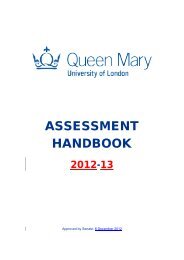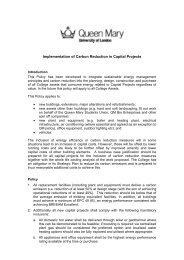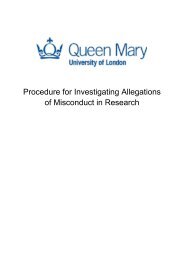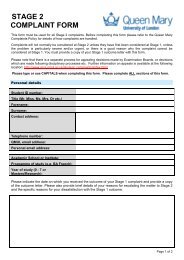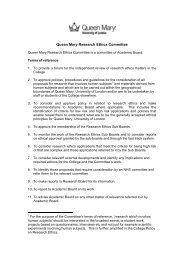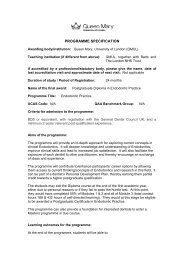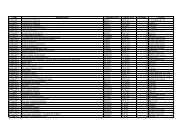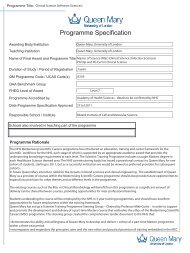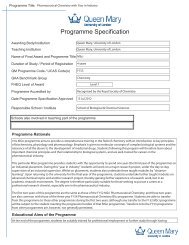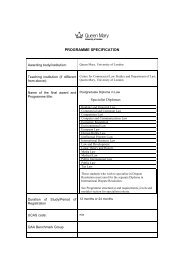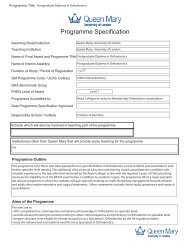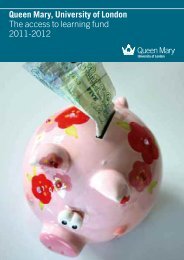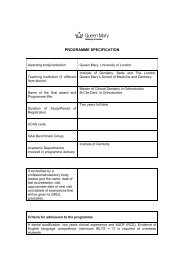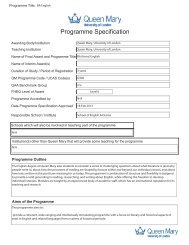Academic Regulations 2010/11 - Academic Registry and Council ...
Academic Regulations 2010/11 - Academic Registry and Council ...
Academic Regulations 2010/11 - Academic Registry and Council ...
Create successful ePaper yourself
Turn your PDF publications into a flip-book with our unique Google optimized e-Paper software.
<strong>Academic</strong> <strong>Regulations</strong> <strong>2010</strong>/<strong>11</strong>DefinitionsPre-requisite module refers to a specified m odule that must be taken beforespecified module is taken.the nextProgramme regulations refers to the regulations of a programme of study, approved bySenate or its delegated authorityProgramme of study (programme) refers to an overall package of modules approved bySenate, or its delegated authority, to lead to an award of the University of London or QMUL.Project or research project see dissertationQMACF is the acronym for the Queen Mary <strong>Academic</strong> Credit Framework, implemented inSeptember 2008, <strong>and</strong> refers to a structure of academic credit <strong>and</strong> levels for all modules <strong>and</strong>programmes leading to taught awards of QMUL or University of London.Qualifying mark refers to a specified minimum mark that must be obtained in one or moreelements of assessment in order to pass a module. This is in addition to the requirement toobtain a pass in the module mark in order to pass a module. E.g. “students must obtain aminimum aggregated, weighted mark of 30% for coursework as well as a module mark of40% in order to pass the module”.Registration refers to a process where students of QMUL sign up for a programme of study<strong>and</strong> its associated modules.Required coursework refers to coursework that a student is required to complete to theprescribed st<strong>and</strong>ard, <strong>and</strong> to submit, but which does not contribute to the result.Research Students refers to students registered for a programme of research studydesignated as such. Research studies programmes have separate academic regulations.Resit refers to the repeat of all or part of a module assessment following failure at a previousattempt, which does not involve the repeat of any attendance on the module. Resits do notcount towards the value of academic credit for which a student must normally be registeredin an academic, or developmental, year.Retake refers to the repeat of a module following failure at a previous attempt, whichinvolves attendance <strong>and</strong> completion of all elements of the module, <strong>and</strong> the submission of allcoursework, whether assessed or not. Retakes count towards the value of academic creditfor which a student must normally be registered in an academic, or developmental, year.Retakes incur a pro-rata tuition fee.Special <strong>Regulations</strong> refers to regulations for a programme that diverge from the general<strong>Academic</strong> <strong>Regulations</strong>, for good reason, <strong>and</strong> are approved by Senate or its delegatedauthority.Students refers to students of QMUL. Ordinance C1 describes those persons who arestudents of QMUL <strong>and</strong> associate students of QMUL. These regulations apply to all studentsundertaking undergraduate <strong>and</strong> postgraduate taught study at QMUL who are designated asa student or associate student <strong>and</strong> any other person, or group of persons, whom Senatedeclares to be a student of QMUL.Subject in the case of LLB refers to an individual assessed component of teaching <strong>and</strong>learning that is packaged to form a programme of study. Where ‘module’ is referred to inPage 7 of <strong>11</strong>0



